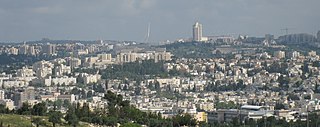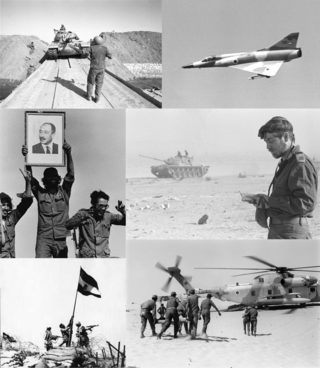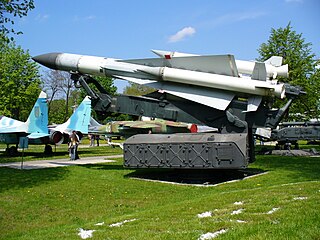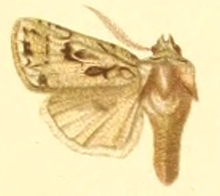
The Gaza Strip, or simply Gaza, is a Palestinian exclave on the eastern coast of the Mediterranean Sea. The smaller of the two Palestinian territories, it borders Egypt on the southwest for 11 km (6.8 mi) and Israel on the east and north along a 51 km (32 mi) border. Together, the Gaza Strip and the West Bank make up the State of Palestine, while being under Israeli military occupation since 1967.

Jerusalem is a city in Western Asia, on a plateau in the Judaean Mountains between the Mediterranean and the Dead Sea. It is one of the oldest cities in the world, and is considered holy to the three major Abrahamic religions—Judaism, Christianity, and Islam. Both Israelis and Palestinians claim Jerusalem as their capital, as Israel maintains its primary governmental institutions there and the State of Palestine ultimately foresees it as its seat of power. Neither claim, however, is widely recognized internationally.

The Six-Day War or June War, also known as the 1967 Arab–Israeli War or Third Arab–Israeli War, was fought between Israel and a coalition of Arab states from 5 to 10 June 1967.

The West Bank is a landlocked territory near the coast of the Mediterranean in the Levant region of Western Asia that forms the main bulk of the Palestinian territories. It is bordered by Jordan and the Dead Sea to the east and by Israel to the south, west, and north. It has been under an Israeli military occupation since the 1967 Arab-Israeli War. Since the Oslo II Accord was signed in 1995, its area has been split into 165 Palestinian enclaves, that are under total or partial civil administration by the Palestinian National Authority (PNA), and a contiguous area containing 230 Israeli settlements into which Israeli law is "pipelined". The West Bank includes East Jerusalem. Israel administers the West Bank excluding East Jerusalem as the Judea and Samaria Area district, through the Israeli Civil Administration.

Yahweh was an ancient Levantine deity, and national god of the Israelite kingdoms of Israel and Judah. Though no consensus exists regarding the deity's origins, scholars generally contend that Yahweh emerged as a "divine warrior" associated first with Seir, Edom, Paran and Teman, and later with Canaan. The origins of his worship reach at least to the early Iron Age, and likely to the Late Bronze Age, if not somewhat earlier.

The Yom Kippur War, also known as the Ramadan War, the October War, the 1973 Arab–Israeli War, or the Fourth Arab–Israeli War, was an armed conflict fought from October 6 to 25, 1973, between Israel and a coalition of Arab states led by Egypt and Syria. The majority of combat between the two sides took place in the Sinai Peninsula and the Golan Heights—both of which were occupied by Israel in 1967—with some fighting in African Egypt and northern Israel. Egypt's initial objective in the war was to seize a foothold on the eastern bank of the Suez Canal and subsequently leverage these gains to negotiate the return of the rest of the Israeli-occupied Sinai Peninsula.

Zionism is a nationalist movement that emerged in the 19th century to espouse support for the establishment of a homeland for the Jewish people in Palestine, a region roughly corresponding to the Land of Israel in Jewish tradition. Following the establishment of Israel, Zionism became an ideology that supports "the development and protection of the State of Israel".

The Israel Defense Forces, alternatively referred to by the Hebrew-language acronym Tzahal (צה״ל), is the national military of the State of Israel. It consists of three service branches: the Israeli Ground Forces, the Israeli Air Force, and the Israeli Navy. It is the sole military wing of the Israeli security apparatus. The IDF is headed by the Chief of the General Staff, who is subordinate to the Israeli Defense Minister.

The Israeli–Palestinian conflict is one of the world's most enduring conflicts, beginning in the mid-20th century. Various attempts have been made to resolve the conflict as part of the Israeli–Palestinian peace process, alongside other efforts to resolve the broader Arab–Israeli conflict. Public declarations of claims to a Jewish homeland in Palestine, including the First Zionist Congress of 1897 and the Balfour Declaration of 1917, created early tensions in the region after waves of Jewish immigration. Following World War I, the Mandate for Palestine included a binding obligation for the "establishment in Palestine of a national home for the Jewish people". Tensions grew into open sectarian conflict between Jews and Arabs. The 1947 United Nations Partition Plan for Palestine was never implemented and provoked the 1947–1949 Palestine War. The current Israeli-Palestinian status quo began following Israeli military occupation of the West Bank and Gaza in the 1967 Six-Day War, known as the Palestinian territories.

Benjamin "Bibi" Netanyahu is an Israeli politician who has been serving as the prime minister of Israel since December 2022, having previously held the office from 1996 to 1999 and again from 2009 to 2021. He is the chairman of the Likud party. Netanyahu is the longest-tenured prime minister in the country's history, having served for a total of over 15 years. He is also the first prime minister to be born in Israel after its Declaration of Independence.

Golda Meir was an Israeli politician who served as the fourth Prime Minister of Israel from 1969 to 1974. She was modern Israel's first and only female head of government, the first and only female head of government in the modern Middle East, and the fourth elected female head of government or state in the modern world. She has been described as the "Iron Lady" of Israeli politics, with a reputation for being down-to-earth and a persuasive speaker.

The Knesset is the unicameral legislature of Israel. As the supreme state body, the Knesset is sovereign and thus has total control of the entirety of the Israeli government.

Palestine, officially the State of Palestine, is a state located in the Southern Levant region of West Asia. Officially governed by the Palestine Liberation Organization (PLO), it claims the West Bank and the Gaza Strip as its territory, though the entirety of that territory has been under Israeli occupation since the 1967 Six-Day War. As a result of the Oslo Accords of 1993–1995, the West Bank is currently divided into 165 Palestinian enclaves that are under partial Palestinian National Authority (PNA) rule; the remainder, including 200 Israeli settlements, is under full Israeli control. The Gaza Strip has been ruled by the militant Islamic group Hamas and has been subject to a long-term blockade by Egypt and Israel since 2007.

The Israel national football team represents Israel in international football, and is governed by the Israel Football Association (IFA).

The NPO Almaz S-200 Angara/Vega/Dubna, NATO reporting name SA-5 Gammon, is a long range, high altitude surface-to-air missile (SAM) system developed by the Soviet Union in the 1960s to defend large areas from high-altitude bombers or other targets. In Soviet service, these systems were deployed primarily on the battalion level, with six launchers and a fire control radar.

Gal Gadot-Varsano is an Israeli actress and model. She was crowned Miss Israel 2004 and represented her country at the Miss Universe 2004 pageant. She then served in the Israel Defense Forces for two years as a combat fitness instructor, whereafter she began studying at IDC Herzliya while building her modeling and acting careers.

The Arab–Israeli conflict is an ongoing intercommunal phenomenon involving political tension, military conflicts, and other disputes between various Arab countries and Israel, which escalated during the 20th century, but had mostly faded out by the early 21st century. The roots of the Arab–Israeli conflict have been attributed to the support by Arab League member countries for the Palestinians, a fellow League member, in the ongoing Israeli–Palestinian conflict; this in turn has been attributed to the simultaneous rise of Zionism and Arab nationalism towards the end of the 19th century, though the two national movements had not clashed until the 1920s.

Jews or Jewish people are an ethnoreligious group, nation or ethnos native to the Levant, originating from the ancient Israelites and Hebrews of historical Israel and Judah. Jewish ethnicity, nationhood, and religion are strongly interrelated, as Judaism is the ethnic religion of the Jewish people, although its observance varies from strict to none.

The Institute for Intelligence and Special Operations, popularly known as Mossad, is the national intelligence agency of Israel. It is one of the main entities in the Israeli Intelligence Community, along with Aman and Shin Bet.

Ayala Procaccia is a retired Israeli Justice of the Supreme Court of Israel. Before being elected to the Supreme Court in 2001, she served as a judge in the Jerusalem Magistrates’ Court until 1993 and in the Jerusalem District Court from 1993 to 2001. While active in the Israeli law courts, Ayala Procaccia worked to change Israeli law to champion equality for all, regardless of gender or religion. Proponents of Procaccia say that she strives for an equitable and just society; critics of her work said that she promoted a judicial dictatorship over the government.



















